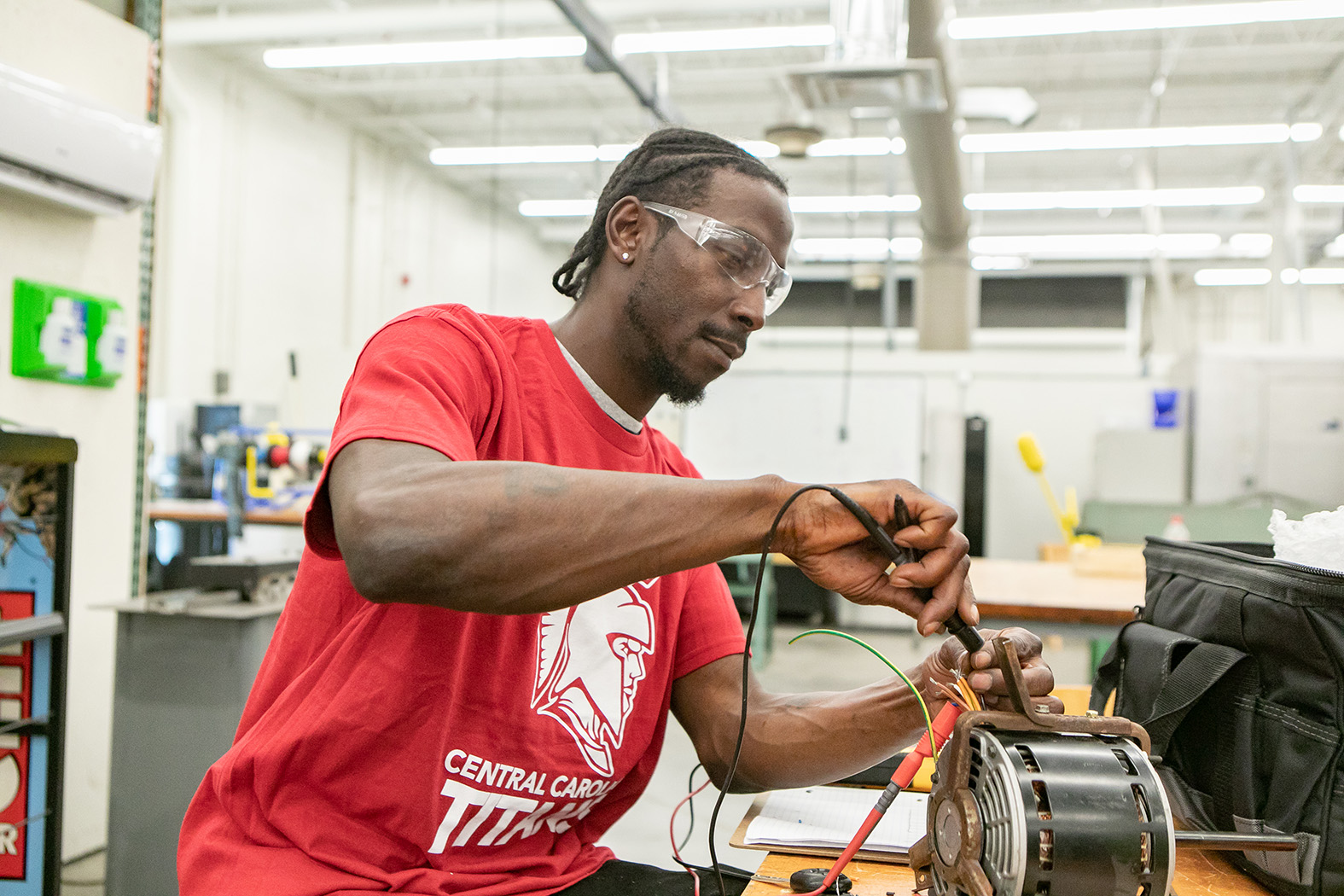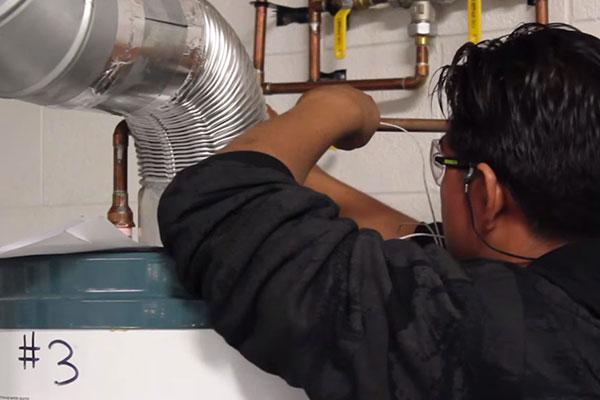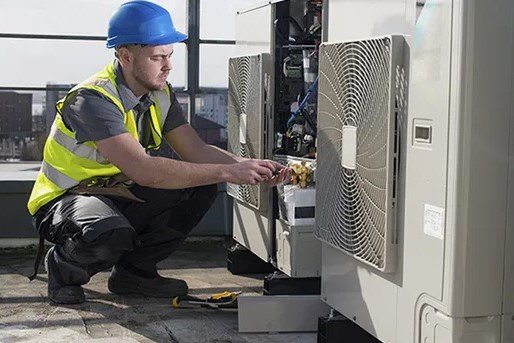A Heating, Refrigeration, and Air Conditioning (HVAC) Technician installs, maintains, and repairs heating and cooling systems. They ensure indoor comfort and energy efficiency in residential and commercial buildings.
HVAC technicians play a crucial role in modern comfort. They specialize in various systems, including furnaces, air conditioners, and refrigeration units. Technicians work on both residential and commercial equipment, ensuring optimal performance and safety. Their expertise helps minimize energy costs and enhances indoor air quality.
Training often includes certification programs, equipping them with the skills needed to tackle complex systems. Technicians must stay updated on the latest technologies and regulations in the industry. This profession offers opportunities for growth and stability, making it a rewarding career choice for those interested in mechanical systems and customer service.
Heating Refrigeration and Air Conditioning Technician
Table of Contents
Career Path
The career path of a Heating, Refrigeration, and Air Conditioning (HVAC) Technician is both exciting and rewarding. This profession involves working with essential systems that keep our homes and businesses comfortable. Technicians install, maintain, and repair heating and cooling systems. They are crucial for ensuring our environments are safe and pleasant. Starting this career involves specific education and certification. Understanding these requirements helps pave the way to success.
Education Requirements
To become an HVAC Technician, a solid education is vital. Most technicians complete a high school diploma or equivalent. This provides a foundation in basic math and science. Many pursue specialized training through vocational schools or community colleges. Programs typically take 6 months to 2 years.
Key topics covered in HVAC training include:
- Thermodynamics
- Refrigeration cycles
- Electrical systems
- Safety protocols
Hands-on experience is crucial. Many programs offer internships or apprenticeships. This allows students to work alongside experienced professionals. Here’s a quick look at common educational paths:
| Education Level | Duration | Key Focus Areas |
|---|---|---|
| High School Diploma | 4 years | Basic math and science |
| Vocational Training | 6 months – 2 years | Hands-on training and theory |
| Associate Degree | 2 years | Advanced HVAC systems |
Certification Options
Certification enhances job prospects in the HVAC field. Many employers prefer certified technicians. Certification shows expertise and knowledge in the industry. Several organizations offer certifications, including:
- Environmental Protection Agency (EPA)
- North American Technician Excellence (NATE)
- Refrigeration Service Engineers Society (RSES)
Obtaining the EPA certification is crucial for handling refrigerants. NATE certification proves skills and can lead to higher pay. RSES offers specialized certifications for advanced skills. Here are the common certifications:
| Certification | Focus Area | Validity |
|---|---|---|
| EPA Certification | Refrigerant handling | Lifetime |
| NATE Certification | General HVAC skills | 2 years |
| RSES Certification | Advanced refrigeration skills | 3 years |
By meeting education and certification requirements, technicians can boost their careers. This opens doors to more job opportunities and higher salaries.

Job Responsibilities
A Heating Refrigeration and Air Conditioning Technician, also known as HVAC Technician, plays a vital role in our comfort. This job includes a variety of responsibilities. Technicians ensure that heating, cooling, and refrigeration systems work efficiently. Their work keeps homes and businesses comfortable all year round.
Installation Tasks
Installation tasks are a key part of an HVAC Technician’s job. This involves setting up new heating and cooling systems. Here are the main tasks involved in installations:
- Reading blueprints: Technicians must understand the layout of buildings.
- Gathering tools: Necessary tools include wrenches, drills, and gauges.
- Installing units: This includes air conditioners, heaters, and ductwork.
- Connecting systems: Technicians connect electrical and gas lines.
- Testing systems: After installation, testing ensures everything works well.
Here’s a quick overview of the installation process:
| Step | Action |
|---|---|
| 1 | Review blueprints and plans |
| 2 | Prepare tools and materials |
| 3 | Install HVAC units |
| 4 | Make electrical and gas connections |
| 5 | Test system performance |
These tasks require both technical skills and safety knowledge. Technicians must follow safety guidelines to prevent accidents.
Maintenance Duties
Maintenance duties are essential for keeping HVAC systems running smoothly. Regular maintenance helps prevent breakdowns. Technicians check systems to ensure they operate efficiently. Here are the main maintenance tasks:
- Cleaning components: Dust and debris can block airflow.
- Replacing filters: Dirty filters reduce air quality.
- Checking refrigerant levels: Low levels can harm the system.
- Inspecting electrical connections: Loose wires can cause failures.
- Testing thermostat settings: This ensures correct temperature control.
Maintenance is usually scheduled twice a year. Here’s a simple list of what is checked:
- Inspect and clean coils
- Check for leaks
- Test system controls
- Lubricate moving parts
- Ensure proper airflow
Regular maintenance helps extend the life of HVAC systems. It also keeps energy costs down. Technicians provide vital support to ensure comfort in homes and businesses.
Skills Needed
The role of a Heating, Refrigeration, and Air Conditioning (HVAC) Technician is essential for maintaining comfortable environments in homes and businesses. These technicians ensure that heating and cooling systems work efficiently. To succeed, they need a mix of technical and soft skills. Each type of skill plays a vital role in their daily tasks. Understanding these skills can help aspiring technicians prepare for this rewarding career.
Technical Skills
Technical skills are crucial for HVAC technicians. These skills involve hands-on abilities and knowledge of various systems. Technicians must understand how heating and cooling units function. They need to diagnose problems and fix them effectively. Here are some key technical skills:
- Electrical Knowledge: Understanding electrical systems is vital. Technicians often work with wiring and circuits.
- Refrigeration Skills: Knowledge of refrigeration cycles is necessary for cooling systems.
- HVAC System Design: Technicians should understand how to design and install HVAC systems.
- Tool Proficiency: Familiarity with hand and power tools is essential for repairs.
- Safety Practices: Knowledge of safety protocols prevents accidents and injuries.
Here’s a summary of some technical skills:
| Skill | Description |
|---|---|
| Electrical Knowledge | Understanding of electrical systems and components. |
| Refrigeration Skills | Knowledge of refrigeration cycles and systems. |
| HVAC System Design | Ability to design and install HVAC systems. |
| Tool Proficiency | Skilled in using various tools for repairs. |
| Safety Practices | Understanding of safety protocols in the workplace. |
Soft Skills
Soft skills are just as important as technical skills. These skills help technicians interact with customers and colleagues. Good communication is key. Technicians need to explain issues clearly. They must listen well to understand customer needs. Here are some essential soft skills:
- Communication: Clear and effective communication with customers is crucial.
- Problem-Solving: Technicians need to think critically and find solutions quickly.
- Teamwork: Working well with others is important in this field.
- Time Management: Technicians must manage their time efficiently to complete tasks.
- Customer Service: Providing excellent service keeps customers happy and loyal.
Here’s a breakdown of soft skills:
| Skill | Description |
|---|---|
| Communication | Ability to convey information clearly and effectively. |
| Problem-Solving | Critical thinking to identify and solve problems. |
| Teamwork | Working collaboratively with others. |
| Time Management | Efficiently managing time to meet deadlines. |
| Customer Service | Providing support and assistance to customers. |
Tools Of The Trade
Heating, Refrigeration, and Air Conditioning (HVAC) technicians are vital for our comfort. They ensure homes and businesses stay warm in winter and cool in summer. Tools of the trade help these professionals perform their job efficiently. Knowing the right tools can make all the difference in their daily tasks.
Essential Equipment
The right equipment is crucial for HVAC technicians. They use various tools to install, repair, and maintain systems. Here are some essential tools:
- Refrigerant gauges: Measure the pressure of refrigerants.
- Thermometers: Check temperatures in systems.
- Multimeters: Test electrical circuits and components.
- Manifold gauge sets: Monitor refrigerant flow.
- Pipe wrenches: Tighten or loosen pipe fittings.
Here’s a table summarizing the tools and their uses:
| Tool | Use |
|---|---|
| Refrigerant gauges | Measure refrigerant pressure |
| Thermometers | Check system temperatures |
| Multimeters | Test electrical circuits |
| Manifold gauge sets | Monitor refrigerant flow |
| Pipe wrenches | Tighten or loosen fittings |
These tools are indispensable for HVAC technicians. They help diagnose issues accurately and perform repairs efficiently. Mastering these tools ensures better service for customers.
Safety Gear
Safety is paramount for HVAC technicians. They work with dangerous equipment and materials. Proper safety gear protects them from potential hazards. Here are key items:
- Safety goggles: Protect eyes from debris.
- Gloves: Safeguard hands from sharp objects.
- Hard hats: Shield heads from falling objects.
- Steel-toed boots: Prevent foot injuries.
- Respirators: Guard against inhaling harmful substances.
Always wear the right safety gear. Here’s a summary of essential safety items:
| Safety Gear | Purpose |
|---|---|
| Safety goggles | Protect eyes |
| Gloves | Safeguard hands |
| Hard hats | Shield heads |
| Steel-toed boots | Prevent foot injuries |
| Respirators | Protect lungs |
Using safety gear minimizes risks. Technicians can focus on their work confidently. A safe technician is an effective technician.
Work Environment
Heating, Refrigeration, and Air Conditioning (HVAC) technicians work in various environments. Their work settings can change daily. They handle systems that keep buildings warm, cool, or comfortable. Understanding their work environment helps in appreciating their role. Technicians face unique challenges in each setting.
Typical Settings
HVAC technicians often find themselves in diverse locations. Each setting presents different tasks and challenges. Here are some common environments where they work:
- Residential Areas: Technicians repair and install systems in homes.
- Commercial Buildings: Work in offices, malls, and retail stores.
- Industrial Sites: Maintain large systems in factories and warehouses.
- Construction Sites: Install new systems in new buildings.
In residential areas, technicians may deal with:
| Task | Equipment |
|---|---|
| Repair Heating Systems | Furnaces, Boilers |
| Install Air Conditioners | Split Systems, Central Air |
On commercial sites, they may handle larger equipment. This includes rooftop units and chillers. Industrial settings require a deep understanding of complex systems. Technicians must adapt to different equipment and safety standards.
Work Hours
The work hours for HVAC technicians can vary widely. Many work full-time hours, but some may work part-time. Here’s a closer look at their schedules:
- Standard Hours: Most technicians work 40 hours a week.
- On-Call Shifts: Many technicians are on-call for emergencies.
- Seasonal Work: Busy seasons may require overtime.
Common shifts include:
- Day Shift: 8 AM to 5 PM
- Evening Shift: 4 PM to 12 AM
- Night Shift: 12 AM to 8 AM
During peak seasons, like summer and winter, hours can increase. Technicians may work evenings and weekends to meet demands. Flexibility is key in this profession. The ability to adapt to changing schedules is essential.

Salary Insights
The role of a Heating, Refrigeration, and Air Conditioning (HVAC) Technician is vital. They ensure our homes and businesses stay comfortable. Understanding the salary insights for this career can help you plan your future. Let’s explore what HVAC technicians earn and what influences their pay.
Average Earnings
The average salary for HVAC technicians varies widely. This depends on experience, location, and industry. Here’s a breakdown of the average earnings:
| Experience Level | Average Salary |
|---|---|
| Entry-Level | $30,000 – $40,000 |
| Mid-Level | $40,000 – $60,000 |
| Experienced | $60,000 – $80,000 |
According to recent data, the national average salary for HVAC technicians is around $50,000 per year. Many technicians also receive benefits like health insurance and retirement plans. Here are some key points about average earnings:
- Entry-level technicians earn less but gain experience quickly.
- Mid-level technicians often specialize, which can boost their pay.
- Experienced technicians may work in management or training roles.
Location greatly impacts salary. Technicians in urban areas usually earn more than those in rural areas.
Factors Affecting Pay
- Location: Cities with high living costs often pay more.
- Experience: More years in the field lead to higher salaries.
- Certifications: Specialized training can increase pay rates.
- Industry: Technicians in commercial settings typically earn more.
According to studies, technicians in the residential sector earn less than those in commercial or industrial sectors. Here’s a simple comparison:
| Sector | Average Salary |
|---|---|
| Residential | $40,000 |
| Commercial | $60,000 |
| Industrial | $70,000 |
Skills also play a role. Technicians with advanced skills, like troubleshooting and repair, may command higher wages. Networking and reputation in the industry can also impact pay.
“`
Job Outlook
The job outlook for Heating, Refrigeration, and Air Conditioning (HVAC) Technicians is bright. These skilled workers are essential for maintaining comfortable indoor environments. As technology advances, the demand for HVAC technicians is expected to grow. This demand offers many job opportunities and career paths.
Industry Growth
The HVAC industry is experiencing significant growth. More people are installing heating and cooling systems. This trend is due to rising temperatures and changing weather patterns. According to the U.S. Bureau of Labor Statistics, employment for HVAC technicians will grow by five percent from 2021 to 2031.
Several factors contribute to this growth:
- Increased construction of new homes and commercial buildings.
- Older systems need replacement and repair.
- Energy-efficient systems are becoming popular.
| Year | Number of Jobs |
|---|---|
| 2021 | 350,000 |
| 2025 | 400,000 |
| 2031 | 450,000 |
Many companies are looking for qualified technicians. Training programs and apprenticeships are available. These opportunities help workers gain necessary skills. The industry offers a stable career with a good income.
Future Trends
Future trends in HVAC focus on technology and sustainability. Smart home technology is gaining popularity. Many homeowners want systems that can be controlled remotely.
Key trends include:
- Increased use of energy-efficient systems.
- Growth in green technology.
- More focus on indoor air quality.
Training for technicians will also evolve. Programs will include lessons on new technologies. Technicians will need to understand:
- Smart thermostats
- Solar heating systems
- Advanced refrigeration techniques
Overall, the HVAC industry is changing rapidly. Technicians who adapt will find many job opportunities. The future is bright for those entering this field.

Advancement Opportunities
Heating, Refrigeration, and Air Conditioning (HVAC) technicians have many ways to grow in their careers. They can specialize in certain areas or move into management roles. With the right skills and experience, technicians can find numerous advancement opportunities. This not only boosts their income but also increases job satisfaction.
Specializations
Specializing in specific areas can open doors for HVAC technicians. These specializations allow technicians to focus on what they love. Here are some popular specializations:
- Commercial HVAC: Focuses on heating and cooling large buildings.
- Residential HVAC: Works on home heating and cooling systems.
- Refrigeration: Deals with cooling systems for food and medicine.
- Green Technology: Specializes in eco-friendly heating and cooling solutions.
- Energy Management: Focuses on improving energy efficiency.
Each specialization offers unique challenges and rewards. Technicians can increase their earnings by gaining certifications. Here’s a simple table showing potential earnings based on specialization:
| Specialization | Average Salary |
|---|---|
| Commercial HVAC | $60,000 |
| Residential HVAC | $50,000 |
| Refrigeration | $55,000 |
| Green Technology | $65,000 |
| Energy Management | $70,000 |
Specializing not only boosts skills but also creates more job opportunities. Technicians can attend workshops and training sessions to stay updated. This helps them remain competitive in the job market.
Management Roles
Moving into management roles is another great advancement opportunity. Technicians with experience can take on leadership positions. These roles focus on overseeing teams and projects. Here are some common management roles in the HVAC industry:
- HVAC Supervisor: Manages daily operations and team performance.
- Service Manager: Oversees service departments and customer relations.
- Project Manager: Coordinates HVAC projects from start to finish.
- Operations Manager: Focuses on overall business efficiency and growth.
These positions often come with higher salaries and benefits. Here’s a table showing average salaries for management roles:
| Management Role | Average Salary |
|---|---|
| HVAC Supervisor | $70,000 |
| Service Manager | $75,000 |
| Project Manager | $80,000 |
| Operations Manager | $85,000 |
Management roles require strong leadership and communication skills. Technicians can improve these skills through training and experience. Seeking out these opportunities can lead to a fulfilling career.
Conclusion
A career as a Heating, Refrigeration, and Air Conditioning Technician offers stability and growth. With the rising demand for skilled professionals, this field promises job security and diverse opportunities. Invest in your training and certifications to excel. Embrace this rewarding path and contribute to creating comfortable environments for everyone.
